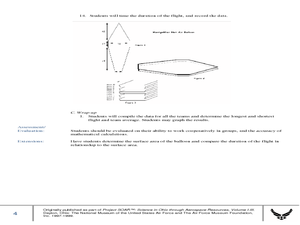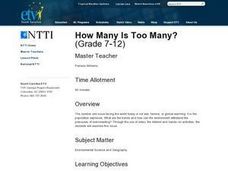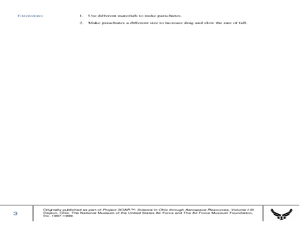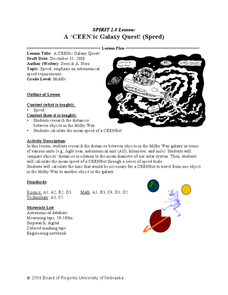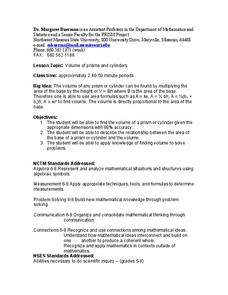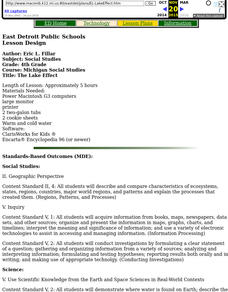Curated OER
Decomposing Artifacts
Seventh graders participate in an experiment in which they calculate the time of decomposition of different materials. In groups, they fill bags with different materials and cover them in soil. After six months, they create a line graph...
Curated OER
Everyone's Playing Basketball
To foster number sense and build problem solving skills, pupils will work through a complex word problem. They will be asked to analyze the data given, solve the problem, then share their thinking process with the class. This activity...
Curated OER
Make a Windmill
Students explore Earth science by conducting an energy experiment in class. In this windmill lesson, students identify how wind has been used to pump water throughout history and the latest developments wind energy has produced. Students...
Science 4 Inquiry
Musical Vibes with Palm Pipes
Ancient people used musical pipes as early as the third millennium BCE. Young scientists explore the workings of musical pipes to better understand the relationship with frequency, length of pipe, and sound waves. They determine the...
NOAA
Methane Hydrates – What's the Big Deal?
Have you ever tried to light ice on fire? With methane hydrate, you can do exactly that. The ice forms with methane inside so it looks like ice, but is able to burn. The lesson plan uses group research and a hands-on activity to help...
Curated OER
Up, Up and Away with the Montgolfier Balloon
Young scholars construct hot air balloons. For this science lesson, students assemble their own balloon using tissue paper and glue. They time the duration of the flight, record data and calculate team averages.
Curated OER
Fun with Balloons
Fifth graders design their own hot air balloon. In this science lesson, 5th graders investigate how factors like weight and sizes affect a balloon's lifting power. They also write math problems based on facts written in the book "The...
Curated OER
Water Density Boundaries
Students create observable layers in water that represent a separation based upon density differences. They model density boundaries using differences in temperature and salinity. They, in groups, perform a meaningful experiment...
Curated OER
Make My Number
Fourth graders relate decimal fractions to common fractions and practice writing decimals as fractions. Through inquiry and game play they write decimals and fractions using the correct form. The first team to correctly answer the...
Curated OER
Principles of Flight: Where are We?
Young scholars explore the concept of topographical maps. In this topographical map lesson, students discuss how airplanes know where to fly. Young scholars use topographical maps to simulate a field trip on the computer.
University of Colorado
The Moons of Jupiter
Can you name the three planets with rings in our solar system? Everyone knows Saturn, many know Uranus, but most people are surprised to learn that Jupiter also has a ring. The third in a series of six teaches pupils what is around...
NASA
Let's Investigate Mars
Take your science class on a hypothetical field trip to Mars with an engaging astronomy instructional activity. After first learning about NASA's Mars rover missions, young scientists plan their own scientific investigations of Earth's...
Science 4 Inquiry
The Ups and Downs of Populations
As the reality of population decline across many species becomes real, pupils learn about the variables related to changes in populations. They complete a simulation of population changes and graph the results, then discuss limiting...
Mascil Project
Parachute Food Drop
Drop a perfect project into your lesson plans. Groups use different building materials to create models of parachutes for food drops. After testing out their prototypes, they make improvements to their designs.
Curated OER
Teaching Biology Through Problem-based Activities
Students plant seeds and observe the life cycle of the organism. They experimentally research the effects of radiation on seed growth. Students determine the effects of environmental pollutants on harvested seed.
Curated OER
How Many Is Too Many?
Students explore the population explosion. They view a video depicting the exponential growth of human population. Students research the internet to project future population data. They perform hands-on, multimedia activities to study...
Curated OER
Does Weight Affect Drag?
Learners investigate how weight affects a parachute's rate of fall. In this investigative lesson students test parachutes, average results and conclude what makes a faster descent.
Curated OER
A CEENic Galaxy Quest!
Students research the distances between objects in the Milky Way. In this astronomy lesson, students calculate the time it would take for a robot to travel from Milky Way object to another. They create a travel package for customers...
Curated OER
Hopper Hunt: IPM Decision-making in Alfalfa
Learners describe migrations and life cycle pattersn of a key alfalfa pest, the Porato Leafhopper. They define the Economic Inquiry Level and Economic Threshold. Students evaluate data in relation to profit as it applies to IPM. They...
Curated OER
Circle Graphs
Sixth graders interpret, create, and display data in a circle graph. In this circle graph lesson plan, 6th graders use a compass, protractors, pizza boxes, and more to create a circle graph and analyze the data they put into it.
Curated OER
Volumes of Prisms and Cylinders
Young scholars calculate the volume of prisms and cylinders. In this geometry lesson plan, students are give part of the formula, and must calculate the missing parts. They use 80% accuracy for their dimensions.
Curated OER
Clean Water vs. Dirty Water
Students study the importance of clean water to the survival of organisms and what activiities and material pollute water. They measure the temperature of water samples and create a class graph.
Curated OER
Determination of Phylogenetic Relationships Using Restriction Analysis
Young scholars applied various mathematical analyses to interpret their data. By using the resulting DNA fragment patterns from several enzymes students established a possible evolutionary relationship among the mice.
Curated OER
The Lake Effect
Fourth graders conduct an experiment demonstrating the effects of water and air temperature on precipitation. They create graphs demonstrating their findings using Claris Works for Kids.







